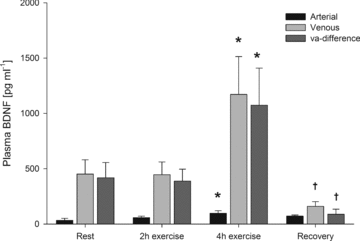Physical Exercise Will Make You Smarter - Exercise Science Explained #1
You've always heard that exercise is good for you. People commonly associate exercise with cardiovascular health, weight loss, and improved self-image. However, a lot of the cognitive and psychological benefits are usually left aside. Probably the most significant benefits can come from a healthier and stronger mind. I'm going to quickly review some studies that have brought forth compelling evidence in support of the idea that physical exercise is significantly beneficial for the human brain.
There is a very important compound in the human brain called Brain-derived neurotrophic factor (BDNF). This compound is responsible for several brain functions such as regulating the maintenance, growth, and survival of neurons as it was demonstrated in a study done in 2004 by Mattson, et. al titled "BDNF and 5-HT: a dynamic duo in age-related neuronal plasticity and neurodegenerative disorders". Which gave a very good foundation for understanding how BDNF works within the human brain.
A prior study done in 2002 titled "From acquisition to consolidation: on the role of brain-derived neurotrophic factor signaling in hippocampal-dependent learning. " by Tyler, et. al, concluded that BDNF strongly influenced memory and learning. While two studies from 1997 and 2002 showed brain tissue from patients with Alzheimer's disease and clinical depression exhibit low expression of BDNF (Connor et al. 1997; Karege et al. 2002). Giving us a good understanding of how good levels of BDNF are desirable for healthy brain functions.
So, how does BDNF relate to physical exercise? One of the first studies looking at the relation between physical activity and BDNF concluded that exercise enhances BDNF transcription in the brain (Oliff et al. 1998). In addition, exercise induces brain uptake of insulin-like growth factor 1, which is a prerequisite for the elevation in BDNF mRNA expression (Carro et al. 2000). However, it is still not clear which region of the brain is responsible for secreting BDNF. It was finally concluded that exercise increases the total amount of BDNF in human brains by three separate studies. (Gold et al. 2003; Vega et al. 2006; Ferris et al. 2007).
One of the latest studies had healthy subjects row in different instances for up to four hours at the time. This was taken from their results paragraph:
"Arterial BDNF increased during rowing (P < 0.05; Fig. 1). The internal jugular venous BDNF concentration increased from 442 ± 272 pg ml−1 at rest to 1172 ± 968 pg ml−1 after 4 h of exercise (P < 0.05) and returned to the resting level after 1 h of recovery (P < 0.05). At rest, BDNF was released from the brain, with the a–v difference being −347 ± 316 pg ml−1, and this release increased with exercise (−902 ± 876 pg ml−1, P < 0.05). After 1 h of recovery, the release of BDNF from the brain returned to resting levels."

This is a chart representing the aforementioned information from the study.
There is still a lot to discover about this compound. Where it comes from exactly and why its secretion is amplified during high levels of physical activity. But, we do know its effects and the correlation to exercise. Will all this being said, it should give you another incentive to get off the couch for a couple hours a day!
TL;DR. Studies showed that exercise increases levels of BDNF, a compound demonstrated to be crucial for brain functions like learning and memory. Conclusion: exercise!
If you enjoyed this post, don't forget to up-vote and follow!